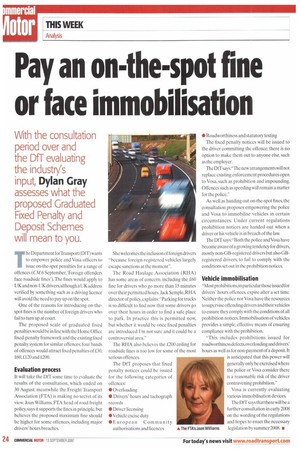Pay an on-the-spot fine or face immobilisation
Page 24

If you've noticed an error in this article please click here to report it so we can fix it.
With the consultation period over and the DfT evaluating the industry's
input, Dylan Gray
assesses what the proposed Graduated Fixed Penalty and Deposit Schemes will mean to you.
The Department forTransport (DfT) wants to empower police and Vosa officers to issue on-the-spot penalties for a range of offences (CM 6 September, 'Foreign offenders face roadside fines'). The fines would apply to UK and non-UK drivers, although a UK address verified by something such as a driving licence will avoid the need to pay up on the spot.
One of the reasons for introducing on-thespot fines is the number of foreign drivers who fail to turn up at court.
The proposed scale of graduated fixed penalties would be in line with the Home Office fixed-penalty framework and the existing fixed penalty system for similar offences; four bands of offences would attract fixed penalties of £30, £60,i1120 and 1200.
Evaluation process
It will take the DfT some time to evaluate the results of the consultation, which ended on 30 August; meanwhile the Freight Transport Association (FTA) is making no secret of its view. Joan Williams, PTA head of road freight policy, says it supports the fines in principle, but believes the proposed maximum fine should be higher for some offences, including major drivers' hours breaches. She welcomes the inclusion of foreign drivers "because foreign-registered vehicles largely escape sanctions at the moment".
The Road Haulage Association (RHA) has some areas of concern, including the £60 fine for drivers who go more than 15 minutes over their permitted hours. Jack Semple, RHA director of policy, explains:"Parking for trucks is so difficult to find now that some drivers go over their hours in order to find a safe place to park. In practice this is permitted now, but whether it would be once fixed penalties are introduced I'm not sure and it could be a controversial area."
The RHA also believes the £200 ceiling for roadside fines is too low for some of the most serious offences The DfT proposes that fixed penalty notices could be issued for the following categories of offences: • Overloading • Drivers' hours and tachograph records • Driver licensing • Vehicle excise duty • European Community authorisations and licences • Roadworthiness and statutory testing The fixed penalty notices will be issued to the driver committing the offence; there is no option to make them out to anyone else, such as the employer.
The DfTsays:"The new arrangements will not replace existing enforcement procedures open to Vosa, such as prohibition and impounding. Offences such as speeding will remain a matter for the police."
As well as handing out on-the-spot fines, the consultation proposes empowering the police and Vosa to immobilise vehicles in certain circumstances. Under current regulations prohibition notices are handed out when a driver or his vehicle is in breach of the law.
The DfT says:"Both the police and Vosa have become aware of a growing tendency for drivers, mostly non-GB-registered drivers but also GBregistered drivers, to fail to comply with the conditions set out in the prohibition notices.
Vehicle immobilisation
"Most prohibitions,in particular those issued for drivers' hours offences, expire after a set time. Neither the police nor Vosa have the resources to supervise offending drivers and their vehicles to ensure they comply with the conditions of all prohibition notices Inimobilisation of vehicles provides a simple, effective means of ensuring compliance with the prohibition.
"This includes prohibitions issued for roadworthiness defects,overloading and drivers' hours as well as for non-payment of a deposit. It is anticipated that this power will generally only be exercised where the police or Vosa consider there is a reasonable risk of the driver contravening prohibition."
Vosa is currently evaluating various immobilisation devices, The DfT says that there will be a further consultation in early 2008 on the wording of the regulations and hopes to enact the necessary legislation by summer 2008. •




























































































































































































